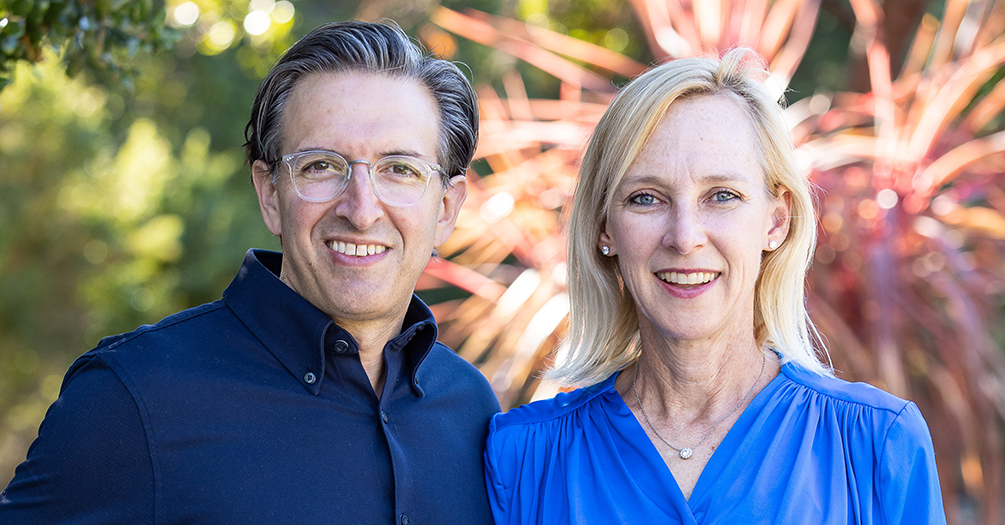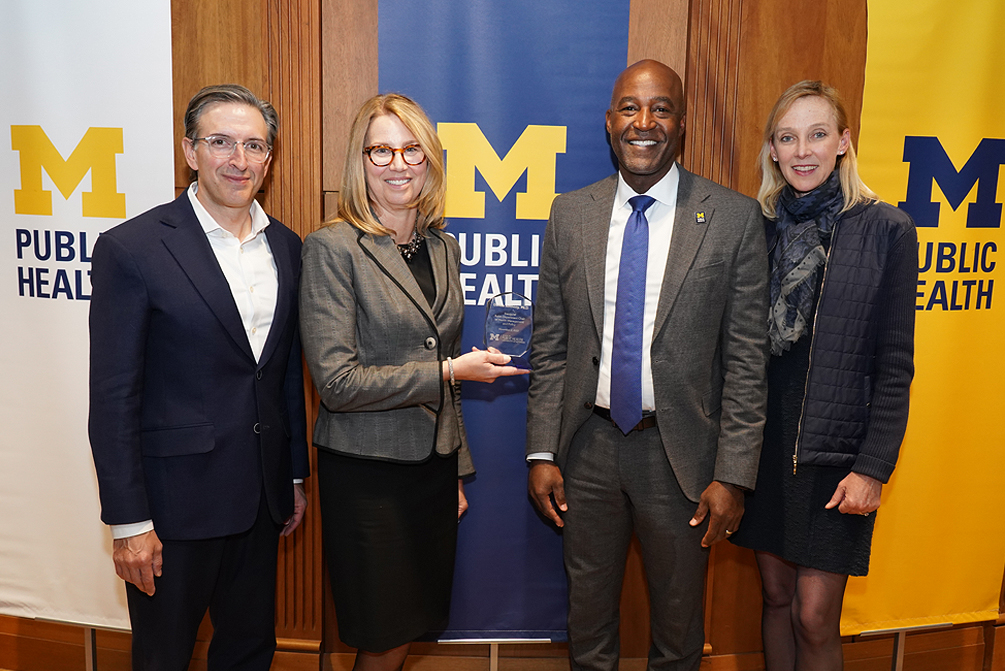Amir and Nicole Rubin’s transformational gift elevates Michigan Public Health leadership

Alumni want to ‘provide resources and support that can further propel the next generation of public health leaders’
By Bob Cunningham
Amir and Nicole Rubin believe the educational foundation they received at the University of Michigan School of Public Health was pivotal to their careers in the healthcare field.
Their Michigan experience and the impact it has had on their careers and lives is why the Rubins have committed to giving a transformational gift: the establishment of the Rubin Department Chair of Health Management and Policy within the School of Public Health, which was approved by the University of Michigan Board of Regents in July.
“The Michigan education and mentorship we received, and the relationships we developed were instrumental in shaping us to better serve in healthcare leadership roles to help make positive impacts on society,” Amir Dan Rubin said. “We wish to help the University of Michigan’s School of Public Health and Department of Health Management and Policy continue to provide the best in research, education and leadership development. We believe that by supporting the school and department, we can further advance the mission of developing leaders who can transform healthcare for the better.”
Nicole Rubin agreed: “Our time in Ann Arbor was truly remarkable. We want students and faculty to have opportunities to advance in their professions and believe that providing resources and support can further propel the next generation of public health leaders.”
Dean of Michigan Public Health F. DuBois Bowman is grateful to the Rubins for their generous gift and “their unwavering support of our school.”
“This endowment will be critical to ensuring that the Department of Health Management and Policy remains a preeminent program for training the next generation of health leaders,” he said.
The Rubins said they believe Michigan Public Health is well-positioned for success given the alignment of the department, school and university.
The Michigan education and mentorship we received, and the relationships we developed were instrumental in shaping us to better serve in healthcare leadership roles to help make positive impacts on society. We wish to help the University of Michigan’s School of Public Health and Department of Health Management and Policy continue to provide the best in research, education and leadership development.”
— Amir Dan Rubin
“Nicole and I believe that having the Department of Health Management and Policy program housed within the University of Michigan School of Public Health is a differentiated and winning combination for making impacts in healthcare, leveraging resources and collaborations across incredible faculty and staff, students and alumni from an array of public health arenas,” Amir said. “Moreover, with the department and school positioned as part of the outstanding broader University of Michigan, additional talent, resource and relationship collaborations can be further leveraged to advance Michigan Public Health’s goal of being leaders in impact.”
“Dean Bowman is the perfect leader for our school at the perfect time,” Nicole said.
“He has long ties to Ann Arbor. The fact that he has a background in biostatistics and he has spent time at other schools of public health allows him to have a unique perspective. He was also a very focused and thoughtful leader during the COVID-19 pandemic, not only providing key leadership to the school, but also to the university. It’s an honor to be able to get to know him in the way that we have.”
Amir Dan Rubin, MHSA ’96, MBA ’96, most recently has been serving as CEO of One Medical, a human-centered and technology-powered national primary care organization seeking to transform healthcare, which now is a part of Amazon. Nicole Rubin, MHSA ’95, is founder and principal of Impact Solutions LLC, and has worked with Ronald McDonald House Charities Inc. as a consultant and advisor for more than a decade.

The Rubins’ journey in public health began with their respective economics undergraduate studies. While at the University of California, Berkeley, Amir serendipitously chose healthcare economics as an elective and immediately was excited about making an impact in the field.
A tragedy in Nicole’s family started her path to public health. While attending the University of North Carolina at Chapel Hill, her uncle died from complications from HIV/AIDS in 1990. She began volunteering at UNC Hospitals, exposing her to the vital role that public health plays in providing healthcare access.
Ultimately, it was the Department of Health Management and Policy faculty, alumni, student body and reputation that were instrumental in bringing them to Ann Arbor.
“Amir was from Los Angeles, and I was from Charleston, South Carolina,” Nicole said. “I don’t think we would’ve ended up at Michigan Public Health if it hadn’t been for the fact that the Health Management and Policy program was recognized among the best in the nation.”
Additionally, the significance of the department’s alumni network in healthcare policy and management and the department’s facilitation in finding outstanding summer internship opportunities also were big draws for the Rubins.
“Furthermore, the fact that the Ross School of Business also had an outstanding program, faculty, culture and reputation made the University of Michigan the top choice for graduate training, as Amir was seeking to complete an MBA as well as an MHSA,” Nicole said. “We were also both fortunate enough to both be accepted, and Amir was grateful for some scholarship support he received.”
It's no surprise then that Michigan Public Health holds deep significance for Amir and Nicole. Not only is it where they launched their careers, it’s where they met 30 years ago.
“Amir was from Los Angeles, and I was from Charleston, South Carolina. I don’t think we would’ve ended up at Michigan Public Health if it hadn’t been for the fact that the Health Management and Policy program was recognized amongst the best in the nation.”
— Nicole Rubin
“We met during orientation, and the beauty of the fall season in Ann Arbor left a lasting impression on us,” Amir said. “We cherish the connections we made with incredible fellow classmates, alumni and faculty. These colleagues were and are exceptional people and leaders, and these memories very much still resonate with us today.”
Denise Anthony is the inaugural Rubin Department Chair of Health Management and Policy. Anthony has served as the chair of the department since October 2021. From 2020 to 2021, she served as director of the Master of Health Informatics degree program, a two-year multidisciplinary program offered jointly by the university’s School of Information, School of Public Health and Medical School.
“To be the inaugural Rubin Department Chair of Health Management and Policy is such an honor,” said Anthony, who has been a professor at Michigan Public Health since 2018. “Amir and Nicole Rubin’s commitment to the program is both impressive and generous. They are incredible alumni because they embody the creativity, innovation and hard work that we see in all our students today and throughout the history of the Health Management and Policy program at Michigan Public Health. I hope to continue to embody those same attributes as the chair and to lead the department into the future with those strengths.”
Funds from the endowment will be used to support efforts to build and strengthen the department by enhancing the visibility and impact of innovative faculty research, strengthening relationships between students and alumni, and supporting strategic leadership initiatives.
The Department of Health Management and Policy is consistently recognized among the top programs in the United States and attracts students from around the world. Alumni from the department hold leadership positions in healthcare management, health policy, advocacy, government and nonprofit organizations.
“We consider it a true privilege to be able to support the department chair to ensure a continued legacy of leadership from the Department of Health Management and Policy,” Nicole said. “The pandemic showed us just how important public health is for a thriving society. The need for strong leaders in the field has never been greater.”
Anthony agrees the relationships the students build at the School of Public Health as well the Michigan alumni network are vital to their personal and career growth.
“The alumni commitment to the department is beyond measure,” she said. “It’s the envy not only of our peer institutions, but of other departments at the University of Michigan. We have alumni involved in every aspect of the program. They are on advisory boards; they are teaching in the classroom; they are coaching case competition teams; they are doing webinars about their organizations; they are providing one-on-one mentorship with our students. The size, strength and leadership level of the Health Management and Policy alumni is just an incredible resource for the department.”
Early exposure to world-class faculty was central to the Rubins’ career advancement.
“I recall our early encounters with legendary faculty making such positive and lasting impressions on us,” Amir said. “Our faculty were approachable yet set a high bar, including luminaries like John Griffith, who had a profound influence on us and on so many leaders.”
The careers of Amir and Nicole both have been marked by leadership roles in healthcare institutions, especially during times of crisis such as the COVID-19 pandemic.
“Building on the experiences we were able to gain at Michigan, we have been privileged to serve in leadership roles to help advance positive impacts in healthcare across multiple organizations,” said Amir, who before serving as CEO at One Medical was an executive vice president at Optum/UnitedHealth Group; CEO at Stanford Health Care in Palo Alto, California; chief operating officer at UCLA Health in Los Angeles; and COO at Stony Brook University Hospital in New York.
Nicole echoes similar sentiments.
“My work with Ronald McDonald House Charities taught me the importance of family-centered care,” she said. “Effective leaders need to understand how to reshape organizations’ perspectives. Leadership can help change the way an organization perceives its role and impact within the broader healthcare system.”
To their points, COVID-19 showcased the critical role of public health and why it’s vital for developing future leaders within the Department of Health Management and Policy.
“The pandemic showcased how collaboration across multidisciplinary teams of scientists, caregivers, technologists and managers could make positive impacts,” Amir said.
“We believe that the Michigan School of Public Health develops exceptional leaders. We wish for future students to benefit from the same strong foundation we received. Having outstanding leaders in the Department of Health Management and Policy is crucial, as they positively help shape faculty, students and the student experience,” Nicole said.
The Rubins have remained actively involved with the School of Public Health. Amir serves on the Griffith Leadership Center Advisory Board, and Nicole sits on the Dean’s Advisory Board.
Looking to the future, the Rubins advise current and prospective students not to forget what made their impacts possible.
“Stay connected, look out for fellow Michigan grads and be available to offer guidance,” Amir said. “Your time and mentorship can be most impactful to people. Being part of a community of alumni who care deeply about the program is essential to making positive change in the world of healthcare.”
“Our journey in public health has been shaped by the education we received and the relationships we developed at Michigan Public Health,” Nicole said. “Public health is a diverse field, and there are countless opportunities. Be open to exploring different paths and remember that leadership can be a driving force in shaping healthcare systems and policies.”
Andrea LaFerle also contributed to this article.
